Forest Bor - real history through the eyes of periodicals, part 3 (1901-1914)
The topic of this article is the objective history of the legendary haunted forest Bor near České Budějovice and Branišov.
Through various local, i.e. České Budějovice periodicals, which were carefully studied by the writer Jaromír Jindra, we will look at the history of this forest in the years 1865-1914. This is an overview of all published reports or mere notes concerning the forest. They allow us to understand how society perceived this forest at different times and whether it really was the scene of so many atrocities as legends attribute to it.
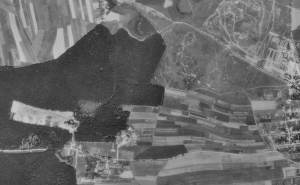
In the third part of our comprehensive study, we will look at the Bor forest between 1901 and 1914. For this period we have the Jihočeské Listy, a periodical published in České Budějovice. Jihočeské Listy did not mention trips to Bor, as was the case with Budivoj or Jihočeský Dělník, from which we drew in the previous two articles. It is possible that they did not deal with this area of leisure, or that the era of joint trips to the countryside around the town was coming to an end. At least in the media sphere of the time.
It should be noted that the Jihočeské Listy in its articles about the forest of Bor emphasized events that were somehow out of the ordinary. Therefore, in their representation we tend to find reports of violence, thefts, tragic deaths or murders. The very first article from 22 May 1901 is a beautiful example.
Jihočeské Listy, May 22, 1901:
Bully. - On Saturday afternoon the gamekeeper Klauzal caught a boy in the municipal forest of Bor carrying a piece of dry oklestka. Klauzal saw this as a great loss for the village of Budějovice and therefore caught the boy and beat him until he fell to the ground. Then he grabbed him by the ears, stood him up, and beat him again until the boy fell down again. This was repeated several times, and the furious man might have beaten the boy to death had not the soldiers waiting at the army firing range taken hold of him. The boy then escaped, which was fortunate for Klauzal, for his name could not be discovered for the purpose of bringing a criminal charge against him.

Three months later, another report emerged regarding an incident inside Bor; this time it was not the severely punished theft of the wood, but the theft of a velocipede.
Jihočeské Listy, 26 August 1901:
Stolen velocipede. - A certain city forester, took a fine velocipede with him to the forest of Bor on Friday. He hid it in a thicket and went to his work, whereupon he wanted to go to the town. But to his great annoyance he found that the bicycle had disappeared. He immediately reported it to the police and to both pawnbrokers, but the thief has not yet been traced.
With this article, Les Bor is at peace with the Jihočeský List for two years. It was not until the end of 1903 that he was mentioned - again in connection with the theft.
Jihočeské Listy, 28 November 1903:
Theft. - The Gramann couple living in the forest of Bor, in a secluded place called "U Petra", were robbed of clothes and blankets worth about 100 Krejcar.
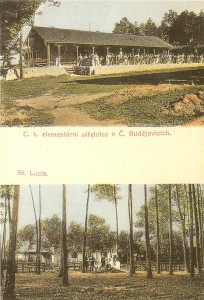
By 1904 the forest of Bor is represented by three articles. The first one has very valuable information... about a sprained left arm.
Jihočeské Listy, June 11, 1904:
Josef Kerl, a servant of Mr. Hájíčka, a wholesaler of metal goods, was riding on a velocipede from the Bor forest on Sunday, and as he was drunk, he fell off his bicycle and sprained his left hand.
Two months later, we can read that the Bor forest was affected by another fire, apparently set negligently.
Jihočeské Listy, 20 August 1904:
Fire in the forest. - On Tuesday, 16 August, at 4 p.m., a fire was reported in the town forest of Bor. Dry grass was burnt in an area of about 30 square metres. The fire was extinguished by workers, so that when the fire brigade from České Budějovice arrived, the danger of another fire had already been removed.
A very interesting event, which may have a much more dramatic context between the lines, took place in September 1904, but the newspaper only mentioned it in the issue of 1 October 1904.
Jihočeské Listy, 1 October 1904:
Mysterious disappearance of girl explained. - In the previous issue we brought news of the mysterious disappearance of Rozalia Žemličková, a pretty maid of 22 years of age, who is in the service of the factory owner Mr. R. Fürth in Divadelní Street. Fortunately, the whole matter was soon afterwards explained quite favourably. On the same day a mason, Čížek, from Třebín, came to the police office and told them that his wife had found a girl in a state of poverty in the stable on Tuesday evening, who gave her name as Žemličková. She said that on Sunday afternoon she had asked permission to go out and had gone to the forest of Bor. There she is said to have fallen ill, fainted, and then spent the rest of the day inside the forest, cold and hungry. It was only on Tuesday that she recovered enough to walk to Trebin. On Wednesday, the factory owner, Mr. Fürth, sent a carriage for Zemlicka and had her transported to the hospital.
Of course, it is possible that Rozalia got sick in the forest. But the question remains what happened during the two days she was not to be found from Sunday to Tuesday. According to Mr. Jaromír Jindra, one hypothesis is that Rozalie Žemličková actually gave birth to a child in the Bor forest that was not wanted, and so she may have buried it somewhere. But the truth is hardly known anymore.
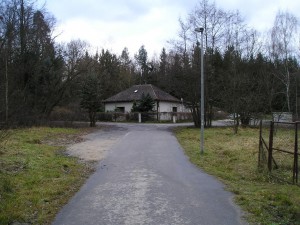
(former grove house)
In the still cold season, in March 1905, the readers of the Jihočeské Listy are informed about the discovery of a frozen man in the forest of Bor, who was not far from death.
Jihočeské Listy 11 March 1905:
A half-frozen man found in the forest. - On the morning of 6 March, a military patrol near the military firing range found a mentally handicapped man, aged about 23, in a thicket in the forest of Bor. He was half frozen and unconscious. The soldiers carried the poor man to the firing range guardhouse, where they brought him to consciousness by rubbing him and giving him a warm drink. The poor man then told that he had been away from home for eight days because he had been ill-treated. He was taken to hospital at noon that day.
Another necessary hospitalization, but this time due to injuries, took place in July 1906. From the brief information, it appears that the Bor forest already had problems with waste from the considerable human activity that was still present at the beginning of the 20th century. Indeed, even today (quite possibly much more so) the Bor forest in places looks more like a waste dump.
Jihočeské Listy, 25 July 1906:
Accidents and injuries. - The schoolgirl Marie Musilova from Č. Budějovice the other day, while picking strawberries in the forest of Bor, she stepped with her bare foot on a splinter from a broken bottle and cut her foot so badly that she had to be taken to hospital.
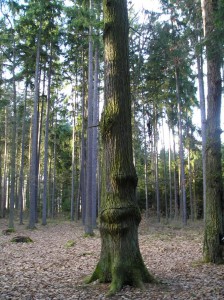
Jihočeské Listy deals extensively with Bor on August 7, 1907; in this report we allude to the pro-Bohemian relations between the Czech and German population living in České Budějovice. First of all, we have to recall in this context that at the beginning of the 20th century the German mayor of České Budějovice (the administration of the town was then exclusively in German hands, although the German population lived here less than the Czechs) Taschek declared a boycott of all Czech business. In practice, this meant that Germans would not trade or buy or otherwise support Czech businesses and tradesmen. In response, the Czech side announced a boycott of all German business... The situation of the bilateral boycott required - as we read in the Jihočeské Listy - a human sacrifice ...
Jihočeské Listy 7 August 1907:
Again a sad victim of the economic struggle in České Budějovice. - The boycott, announced in České Budějovice by the Mayor of České Budějovice Taschek to destroy the Czech tradesmen, is already showing terrible effects, but where the evil mayor of České Budějovice did not anticipate them: namely in the ranks not of Czech but of German tradesmen. Here again is an example of a most sad document: in Krajinská třída, one of the liveliest streets of the inner city, there was no German barber; but there were two Czech barbers, whose clientele included a certain percentage of Germans, who were, of course, always well served, for these Czech barbers are absolutely reliable in their trade. But by the resolution of the German boycott organization, their German customers were to be taken away from them. When this was not possible by harassment and threatening letters to the German "offenders" in question, another attempt was made: a shop was emptied in the building of the town savings bank - a few steps from the shops of the two Czech barbers - and a German barber, Silbermann, was recruited to help destroy the Czech barbers. But it didn't work - Silbermann took his five plums and disappeared in a few weeks. But the saviours of Budějovice Germanism were not deterred by this failure and found another barber. His name was Theodor Lukaschek, who used to have a shop in Biskupská Street, where he was doing quite well. They put this man in a disreputable shop in the house of the Savings Bank, including him with plenty of promises to support him in every possible way. The sad end of Lukaschek's life shows how they kept their promises. Hardly anybody ever entered his outhouse, the poor man could not earn even the barest subsistence, and he was reduced to poverty and despair. On Sunday afternoon, people found him hanging in the municipal forest of Bor. - He had been driven to such a terrible end by the play of a pack of bullies following Taschka's slogan of "cleansing" České Budějovice of Czech tradesmen. We have already mentioned the many declines of German shops and trades in České Budějovice - now the "successes" of the German boycott are escalating to such sad consequences! On whom the curse of the dragon's seed, bearing such terrible fruit, will fall can easily be guessed.
We shall remain with 1907. Jihočeské Listy in the mentioned year bring one more report at the end of November, unfortunately without further details, as it used to be the case with other similar events.
Jihočeské Listy 23 November 1907:
Severe injury to a woodcutter - While felling wood in the municipal forest of Bor on 16 November, a worker, Lukáš, was hit on the head by a falling heavy branch and severely injured, so that he fell to the ground unconscious. He was given medical assistance and transported to hospital by members of the rescue corps.
The periodical informed its readers of the very ugly death in February 1909, a year and a quarter after the injury to the woodcutter.
Jihočeské Listy, February 3, 1909:
Fatal accident of an old man. - Mr. Navara, a peasant of Branišov, aged sixty, went to the forest of Bor last week to get some woods. As he was going back, the wagon loaded with the woods accidentally overturned on him and before help arrived, Navara was crushed under the wagon and suffocated.
Another death occurred in June 1912 when the disappearance of a soldier, missing for six weeks, was solved. Forest Bor thus had another suicidal cross, this time caused by an unresolved crisis of unhappy love.
Jihočeské Listy, 19 June 1912:
The corpse of a soldier shot dead was found in the forest of Bor on June 14. The soldier from the 88th regiment, who had been missing for about six weeks and was thought to be a deserter, was recognised in it. His corpse was found by a pupil of the local forestry school when his dog led him to the dead man. The judicial commission ruled him a suicide. The corpse was taken to the military hospital and buried with military honours on Saturday evening. The soldier is said to have despaired of an unhappy love.
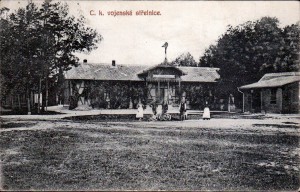
(military firing range)
Just three days later, on 22 June 1912, the Jihočeské Listy returned to the case with a short report that would today be strictly beyond the bounds of journalistic freedom. In one sentence, the reader learns that the soldier who was shot was named František Rost.
A les Bor, 19 February 1913. The newspaper reports the sad incident of a child ingesting poisonous berries, which exacted the ultimate price.
Jihočeské Listy 19 February 1913:
He poisoned himself with poisonous berries. - The eleven-year-old schoolboy J. Koreš from Čtyř Dvorů, son of a carpenter, went to the forest of Bor these days for "kočičky", during which he found some berries which he ate. He soon felt pain and died of poisoning a few hours later.
The very last report, which closes our periodicals with the year 1914, is an attempted suicide, from which it is not clear whether it succeeded in the result or not. This, however, does not detract from the drama of the whole event.
Jihočeské Listy, 22 April 1914:
Suicide attempt. - In the forest of Bor, on the afternoon of 17 April, František Brož, a 35-year-old artistic locksmith, who was a resident of Volečník and lived in České Budějovice, shot himself in the chest with a revolver. He was badly wounded and crawled to the town's fishery, where he fell and was later taken to hospital. His condition is very critical. - Brož, who had travelled a considerable part of the world, was of a somewhat eccentric nature. Why he took his own life is unknown to us.
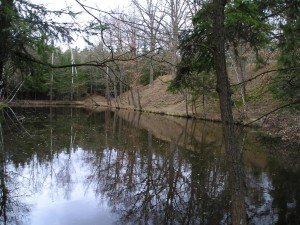
(water reservoir near the former military shooting range)
This is what the Bor forest was like in the eyes of the České Budějovice periodicals from 1865-1914. In conclusion, it should be noted that in the period 1865-1914 we have not been able to find a single record of the Bor forest - even remotely - resembling a haunted place or a place where paranormal phenomena take place. On the contrary. During the years of the Austro-Hungarian Empire, the Bor Forest was a place teeming with life, frequented by the general public and the venue for various social and leisure events.
Although there have been many deaths during the period under review, it should be noted that for a suburban forest it is a fairly common picture, not unlike similarly situated forests in other larger or smaller towns. For it is still true that where there are more people, there is a greater chance that accidents, tragedies or crimes will take place. So to say that the Bor forest is a place where more deaths or accidents have occurred than anywhere else is negligent or a misstatement of fact.
The Forest of Bor between 1865 and 1914 was not an exceptional place. What made it exceptional in people's understanding must therefore have happened later. But that will be the subject of another paper.
In three articles we have learned something about the history of Bor through the eyes of contemporary periodicals of the second half of the 19th century and almost the first quarter of the 20th century. We unpacked individual events and between the lines we learned something about the contemporary understanding of the Bor forest, life in České Budějovice and Branišov, or the relations between Czechs and Germans at this time.
We hope that the work of Mr. Jaromír Jindra will be far more useful in understanding the history of the České Budějovice region than just a glimpse of one forest near České Budějovice over time. And that not only individuals, but also the wider media will begin to take notice of the history that periodicals recorded long before the first shots of the Great (World) War were fired.
author of the article: Ondřej Bezouška
periodicals studied: Jaromír Jindra
proofreading: Kateřina Běhanová, Jaromír Jindra
historical pictures: Historical Budějovice

